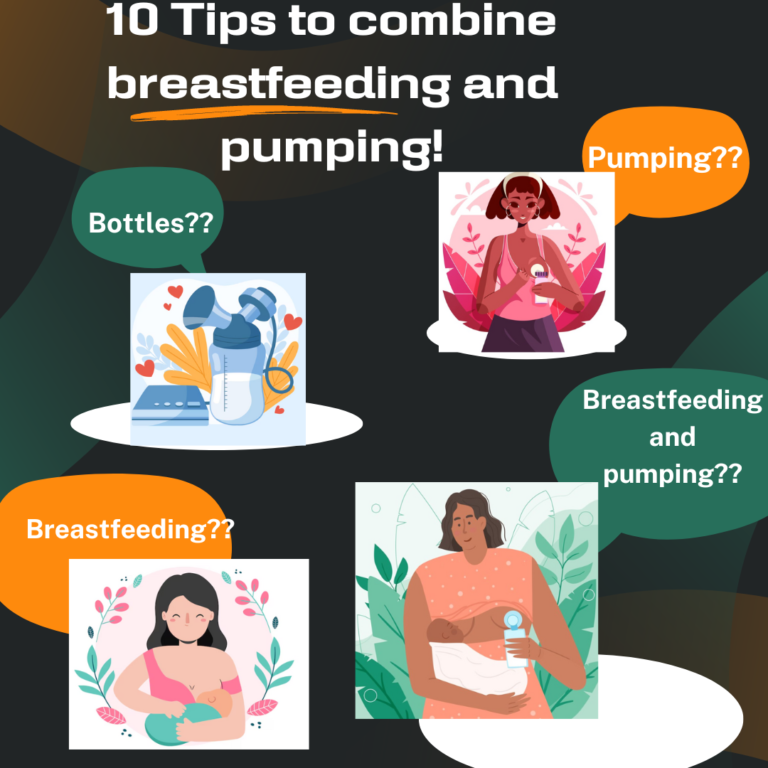11 Research-backed benefits of Breastfeeding for Both Mom and Baby
Breastfeeding is a natural and essential process that provides numerous benefits for both mothers and babies. It involves the act of feeding an infant with breast milk, produced by the mother’s mammary glands. Breast milk is often referred to as “liquid gold” due to its remarkable nutritional and immunological properties. In this article, we will explore the importance of breastfeeding, its definitions according to UNICEF and WHO, and delve into 11 key benefits for both mothers and babies.

What is breastfeeding?
Breastfeeding is the act of nourishing an infant with breast milk, typically from the mother’s breasts. This is a critical phase of infant development, as breast milk provides essential nutrients and antibodies necessary for the baby’s growth and protection against illnesses.
Definition of breastfeeding according to UNICEF
According to UNICEF, breastfeeding is defined as “the process of feeding a child with human milk, directly from the breast or by expressing the milk, and giving it to the child by cup, spoon, syringe, or other means.”
Definition of breastfeeding according to WHO
The World Health Organization (WHO) defines breastfeeding as “the normal way of providing young infants with the nutrients they need for healthy growth and development. It is a unique biological and emotional basis for child development.”
What are some of the benefits of breastfeeding for the neonate, besides nutritional value?
Breastfeeding offers numerous benefits for the neonate (newborn baby) beyond its essential nutritional value. To know more about best breastfeeding positions read this blog . Here are some of these additional advantages:
- Immune System Boost
- Digestive Health
- Skin-to-Skin Contact
- Optimal Oral Development
- Hormonal Regulation
- Lower Risk of Sudden Infant Death Syndrome (SIDS)
- Nutrient Absorption
- Reduced Risk of Allergies and Asthma
- Enhanced Cognitive Development
- Lower Risk of Childhood Obesity
- Gut Health
- Customized Nutrition
- Pain Relief
- Emotional Bonding
In summary, breastfeeding offers a wide range of benefits for the neonate, going beyond nutrition to encompass emotional, developmental, and health advantages. It is a unique and irreplaceable aspect of early life that contributes significantly to the overall well-being of the baby.
11 Benefits of Breastfeeding for Both Mom and Baby
Breastfeeding is a profoundly impactful and intimate experience, offering an array of benefits that extend far beyond mere nourishment. It is a biological marvel that not only provides optimal nutrition for infants but also strengthens the emotional bonds between mothers and their babies.
What are the benefits of breastfeeding for Baby ?
- Optimal Nutrition: Breast milk is tailor-made for babies, providing the perfect mix of proteins, fats, vitamins, and minerals essential for healthy growth and development.
- Immune System Boost: Breast milk contains antibodies and immunoglobulins that help protect infants from infections and illnesses during their vulnerable early months.
- Digestive Health: Breast milk is easily digested, reducing the risk of digestive issues like colic and diarrhea in babies.
- Bonding and Emotional Well-being: Breastfeeding fosters emotional bonding between mother and baby through skin-to-skin contact, eye contact, and the release of hormones like oxytocin, promoting maternal and infant emotional well-being.
- Convenience: Breast milk is always available at the right temperature, eliminating the need for formula preparation or bottle sterilization, making feeding more convenient for parents.
- Cost-Effective: Breastfeeding saves money by eliminating the cost of purchasing formula and feeding accessories.
- Reduced Risk of Allergies: Breastfed babies are less likely to develop allergies and asthma later in life due to the protective properties of breast milk.
- Lower Risk of SIDS: Breastfeeding has been associated with a reduced risk of Sudden Infant Death Syndrome (SIDS), a tragic and unexplained cause of infant mortality.
- Lower Risk of Chronic Diseases: Breastfeeding can decrease the baby’s risk of developing chronic conditions such as obesity, diabetes, and certain childhood cancers.
- Optimal Brain Development: Some studies suggest that breastfed babies may have a cognitive advantage, potentially contributing to better brain development.
- Customized Nutrition: Breast milk composition adapts to the baby’s changing nutritional needs, ensuring they receive the right nutrients at each stage of development.

What are the benefits of breastfeeding for mothers?
- Weight Management: Breastfeeding helps mothers lose pregnancy weight more effectively as it burns extra calories and helps the uterus contract back to its pre-pregnancy size.
- Reduced Risk of Breast and Ovarian Cancer: Breastfeeding has been linked to a reduced risk of breast and ovarian cancers in mothers.
- Faster Postpartum Recovery: Oxytocin, released during breastfeeding, aids in uterine contractions, reducing postpartum bleeding and speeding up recovery.
- Natural Contraceptive: Exclusive breastfeeding can act as a natural form of contraception for the first six months, although it’s not foolproof and should be discussed with a healthcare provider.
- Emotional Well-being: Breastfeeding can promote maternal mental health by reducing stress and enhancing emotional well-being through the release of bonding hormones.
- Economical: Breastfeeding saves money by eliminating the need for formula and associated feeding equipment.
- Sustainable: Breastfeeding is environmentally friendly, as it produces no waste from formula containers or bottle manufacturing.
- Convenience: Breastfeeding is convenient, as there is no need to carry bottles or formula when traveling, and it requires no preparation.
- Bonding: Breastfeeding strengthens the emotional bond between mothers and their babies, fostering a deep sense of connection.
- Reduced Risk of Type 2 Diabetes: Some research suggests that breastfeeding may lower a mother’s risk of developing type 2 diabetes later in life.
- Personal Satisfaction: Many mothers find personal satisfaction in providing the best possible nutrition and care for their infants through breastfeeding.
It’s a precious and natural way to nurture and nourish infants while enhancing maternal well-being. However, it’s important to remember that breastfeeding is a personal choice, and mothers should make decisions that best suit their circumstances and health. Support and guidance from healthcare professionals can be invaluable in this journey.
Conclusion
Breastfeeding is not just a source of nutrition; it’s a profound act of love and care between a mother and her baby. The benefits of breastfeeding extend beyond just physical health, impacting emotional and psychological well-being for both mother and child. Choosing to breastfeed can provide lifelong advantages and should be encouraged and supported whenever possible.
Frequently Asked Question’s
- How long should I breastfeed my baby?
Breastfeeding is recommended for at least the first six months of life, and it is advisable to continue breastfeeding alongside complementary foods for up to two years or more.
2. Can I breastfeed if I return to work or have a busy schedule?
Yes, it’s possible to continue breastfeeding while working or managing a busy lifestyle. You can express and store breast milk for later use or consider nursing during non-working hours.
3. What if I can’t breastfeed due to medical reasons or personal choice?
While breastfeeding is beneficial, it’s essential to prioritize the health and well-being of both mother and baby. If you can’t breastfeed, speak with a healthcare provider to explore alternative feeding options such as formula feeding, which can also provide adequate nutrition and care for your baby.














+ There are no comments
Add yours